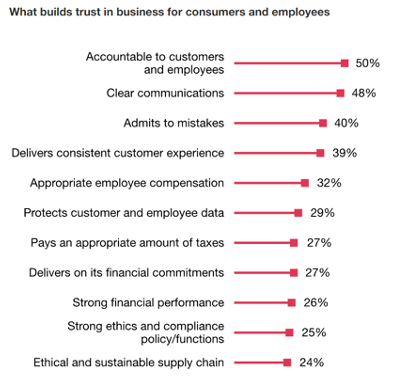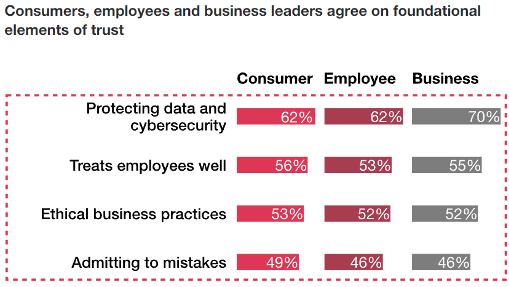Tags: Communication & Engagement, Work-life balance, Employees
In order to explore key themes around trust, PwC conducted this research surveying business leaders, employees and consumers. The survey sought to provide actionable information about leaders’, employees’, and consumers’ priorities in order to enable the maximisation of trust.
The research was conducted in August 2021 with a sample of more than 500 business leaders and 1,000 consumers in the US, the majority of whom are employed by US companies.
The research found agreement between the three groups in some key areas, not least on what they perceive to be the foundational elements of trust. There were also some disconnects, for example between what consumers see as important for trust and what businesses are actually doing.
The pandemic’s impact on consumer and employee trust
- 80% of consumers say that their trust in energy, utilities and mining, as well as consumer markets companies, stayed the same or grew since before the pandemic.
- Over half of consumers have at least “a fair amount of trust” in companies in every industry. Consumer markets (68%) and healthcare (65%) lead the pack, while private equity (56%) and government (54%) rank lowest.
- 80% of employees report trusting their company the same or more now than before the pandemic.
- 84% of employees report trusting their direct manager the same or more since the pandemic.
- Employees cited the highest levels of trust (either trusting them completely or a fair amount) in their direct managers, coworkers and companies (all 77%) compared to 71% for their CEOs, 67% for their company’s board and 59% for other companies in the industry.
Too much talk and little ownership: disconnects and consequences
- Almost half (49%) of consumers have started or increased purchases from a company because they trust it, and 33% have paid a premium for trust.
- On the other hand, 44% of respondents have stopped buying from a company as a result of a lack of trust.
- 22% of employees said they have left a company because of trust issues, while 19% have chosen to work at one because they trusted it highly.
- Business leaders’ actions on trust often don’t match what they deem “extremely important” — and often don’t address consumer priorities. For consumers, the top driver of trust is accountability, but only 56% of business leaders deem it “extremely important.”, and only 46% say that their companies have implemented it.
- 45% of business leaders have implemented transparent ESG reporting — but only 19% of consumers list it among the top five drivers of trust.
Trust fundamentals for business: where leaders see payoff, progress and pitfalls
- Almost three quarters (73%) of business leaders say that trust helps “a lot” with customer loyalty.
- Many business leaders (between 48% and 58%) also reported a belief that trust helps “a lot” in several other critical areas including reputation, brand and revenue growth.
- Commonly cited barriers to building trust include diverse stakeholder perspectives (43%), current company culture (41%), inability to change supply chain (34%), unsupportive leadership team or board (28%) or negative long-term reputational issues (27%).
Practical steps
- Only half (50%) of business leaders say that their company has actually defined what trust means.
- Even smaller proportions have taken other steps like having a proactive plan for crisis comms (44%) or setting up a trust steering committee (41%).
- The authors identify four “big ideas” that should be borne in mind when seeking to build and maintain trust. These “big ideas”, explained in more detail on the survey webpage, are as follows:
- Be deliberate about your trust strategy
- Consider all your stakeholders — and their conflicts
- Deliver on a finite set of actions
- Deploy technology in ways that truly build trust
Comment
This research tells us that the pandemic has not had a significant negative impact on most relationships of trust explored in the research; in many cases, trust has improved. Particularly striking findings include that four out of five (80%) employees report trusting their company the same or more now than before the pandemic, and an even higher number (84%) report trusting their direct manager the same or more.
It’s not easy to determine why this might be, but we can make some conjectures. Although there have been numerous stories of unethical business practices across all sectors since the beginning of the pandemic, there have been successes too. Healthcare companies, for example, have made massive contributions to the fight against the virus with the development of tests and vaccines, perhaps demonstrating to consumers a large degree of competence and ability to act quickly in a crisis. Tech companies have been key to keeping significant sectors of the economy functioning through the transition to home working. And, although this is not always the case, many workers have felt supported by their employer.


